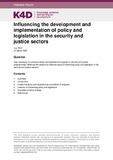| dc.contributor.author | Birch, Izzy | |
| dc.date.accessioned | 2020-04-07T14:48:26Z | |
| dc.date.available | 2020-04-07T14:48:26Z | |
| dc.date.issued | 2020-03-27 | |
| dc.identifier.citation | Birch, I. (2020). Influencing the development and implementation of policy and legislation in the security and justice sectors. K4D Helpdesk Report. Brighton, UK: Institute of Development Studies. | en |
| dc.identifier.uri | https://opendocs.ids.ac.uk/opendocs/handle/20.500.12413/15215 | |
| dc.description.abstract | The literature reviewed for this report suggests that a conducive policy and legal environment is important but not sufficient to progress in security and justice programming, and that a decision on how essential it is will be highly context-specific. Effective policy influence requires attention to a number of complementary factors, including: the level of ownership within both state and society of the reform process; the sequencing of reforms; the skills and mechanisms which enable a rapid response to emerging opportunities; the degree of trust and mutual interest that can be established between stakeholders; and the critical role played by individuals in influential positions, as well as the mechanisms to institutionalise those relationships in the interests of sustaining reform. Policy change is likely to require corresponding action to influence attitudes and behaviours and the social norms that underpin them if implementation is to be achieved. Moreover, conflict-affected environments are inherently uncertain and unpredictable. For both these reasons a long-term perspective is important, married to a sense of realism about what is possible to achieve in the short to medium term, as well as the capacity to adapt and respond flexibly when conditions allow. However, it is also possible for individuals – both within government and outside it – to push through reforms in inhospitable environments if they have the requisite skills, knowledge, and will to do so. The evidence base for security and justice programming in general is considered weak. Important gaps that are relevant to the focus of this paper include empirical evidence about how change occurs, and discussion of outcomes that are difficult to measure, such as changes in the incentives necessary to achieve and implement reforms. Reform processes tend to be analysed in general terms: if a specific policy or legislative change is discussed, the factors that contributed to that change are rarely explained. Gender is addressed primarily in terms of the specific issue of violence against women rather than as part of generic policy reforms. | en |
| dc.language.iso | en | en |
| dc.publisher | IDS | en |
| dc.relation.ispartofseries | K4D Helpdesk Report;783 | |
| dc.rights.uri | https://www.nationalarchives.gov.uk/doc/open-government-licence/version/3/ | en |
| dc.subject | Governance | en |
| dc.subject | Politics and Power | en |
| dc.subject | Security and Conflict | en |
| dc.title | Influencing the development and implementation of policy and legislation in the security and justice sectors | en |
| dc.type | Helpdesk | en |
| dc.rights.holder | © DFID - Crown copyright 2020 | en |
| dcterms.dateAccepted | 2020-03-27 | |
| rioxxterms.funder | Department for International Development, UK Government | en |
| rioxxterms.identifier.project | K4D | en |
| rioxxterms.version | VoR | en |
| rioxxterms.funder.project | 238a9fa4-fe4a-4380-996b-995f33607ba0 | en |

